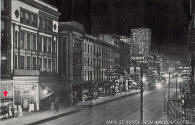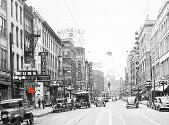|
O. K. HOUCK
... and his
Memphis Music Store |
|
|
 |
|
|
|
|
 |
If ever a businessman was respected and loved by all, it was
O. K. Houck. He had a magnetic personality with a
ready smile and a hearty handshake for all. And he loved
to joke with friends and strangers, and all of them called him
"O.K." He was often referred to as Memphis' first
citizen. It's no wonder that he also founded a great
business that endured from 1883 to 1967. It
was built on the foundation that anything sold there would be
the best at that price that money could buy. And he was
able to instill these values in his employees, who stayed with
the company for years. A visit to the O. K. Music
Store was always a pleasant experience.
(Drum roll!) |
| |
|
|
|
|
|
|
|
|
|
|
|
|
|
|
|
|
Click on small
photos to see an enlargement |
|
|
|
|
|
|
|
|
|
 |
Oliver Kershner Houck was born February 25, 1862, in Decatur,
Illinois. The family moved to Nashville, Tennessee in
1873. To everyone he was known as "OK".
O.
K'.s father had married Julia C. French and her brother, Jesse French, was a famous piano manufacturer
who
had a
music store in Nashville with branches in other parts of the
country. The entire French family was totally involved
with music. When he was 13, O.K. quit school and
worked in his uncle Jesse's Nashville store to learn the music business. He also
spent time traveling throughout the country selling organs and
pianos. |
|
O, K. Houck |
|
|
|
|
 |
 |
 |
 |
 |
 |
| Jesse French |
Nashville
Store |
French
Billhead |
Bookmark |
Published
Music |
3 Sons |
|
|
|
|
|
|
359 Main Street .
303 S. Main Street ...
after 1905 |
|
|
|
O.
K.'s father managed the French Piano Co branch store in Memphis.
When he was 21, O. K. moved to Memphis, and with his father,
opened O. K. Houck & Co at 359 Main Street, specializing
in music publishing and the sale of sheet music. The
business prospered from the very beginning, and would become the
leading establishment in the Mid-South. O. K.'s brother, Jesse
F. Houck, worked side by side with him in the Houck store.
Jesse soon went to Little Rock to open a Houck store there.
Stores were later opened in Nashville, Shreveport, and Chicago.
None of these stores were considered "branches". They were
all individual stores dedicated to the area they served.
Jesse remained in Little Rock until 1914 when he was called home
to assist in the expanding Memphis business. |
 |
| |
Jesse F.
Houck |
|
|
|
 |
 |
 |
 |
| 1902 - 359
Main |
Interior of
OK Houck |
1909 - 303
S. Main |
1911 -
303 S. Main |
|
|
|
 |
 |
 |
 |
 |
 |
| 1886 Ad |
1896
Competition |
Contest
Winner |
Sheet Music |
Sheet Music |
Sheet Music |
|
|
Above: Some
of the various music published by O, K. Houck Piano Co ... and
the sheet music |
|
|
|
|
|
|
|
|
|
|
 |
|
|
|
|
 |
In
1903 the company name changed to O. K. Houck Piano Co. and the
business began to sell and rent musical instruments. O. K.'s father, John Cassell Houck,
had continued to manage the
nearby French Piano Co. and this is surely the reason that the
O.K. Houck & Co. branched out into the same business. By 1900,
the Jesse French Piano Co and the O.K. Houch Piano Co had
merged. In 1905 the business address changed to 103 S.
Main when the new Memphis numbering system was introduced. In
the 1920's the Houck Co opened a warehouse at 100 S. Front
Street. |
 |
|
John C.
Houck |
|
Consolidation ... |
|
|
|
 |
From the
beginning O. K. stressed efficiency, absolute honesty, and total integrity. Plus,
with his lovable dispositon, he
also saw the humor in any situation. This made him stand
out in business. He was
active in several Memphis Masonic organizations and filled the
highest offices in practically every stage. After his death,
several lodges were named the O. K. Houck lodge. He was also a
member of all the local secret societies (social clubs) as
well as three humorous organizations. And he was chairman of
the Business Men's Club (Chamber of Commerce) . His committee
annually raised $50,000 for all public purposes sponsored by the BMC. |
|
O. K. Houck |
|
|
|
|
|
|
|
|
 |
 |
 |
 |
 |
| 1918 Letter |
1921
Billhead |
Early
"Sticker" |
Token |
1919 Ad |
|
|
|
|
|
|
|
|
|
|
|
|
|
|
|
|
102 S. Main
Street |
|
|
|
The Great
Depression hit the Houck company hard . None of the out of
town Houck stores made it. The original Memphis store filed for
bankruptcy in 1933, but managed to survive. After the store
came out of bankruptcy, they moved across the street to 102 S. Main
in 1936. They remained in this location at least until
1942.
|
|
|
 |
 |
 |
 |
|
102 S. Main
|
Houck
Billboard |
|
Piano Rolls |
|
|
|
|
|
|
Philanthophy
|
|
|
 |
O. K.
Houck laid down the principle of the "square deal" and absolute
honesty, with a slogan of "One price - no commissions" and insisted
that every item sold be the BEST at that price that money could buy.
And he set about hiring a remarkable workforce of earnest men and
women who dedicated themselves to his ideas of service.
He lived his life this way. This was so strongly established that even after his death, the
workforce continued to impart it to all newcomers. Plus the
sheer volume and range of his financial donations surpassed those of
any other Memphian during this generation. He gave to the
limit of his means, and sought nothing for himself in return.
His last benefaction was a gift on his deathbed to the Hospital for
Crippled Children. |
| O. K. Houck |
|
|
|
|
|
|
|
|
|
 |
 |
 |
 |
 |
 |
| 1918 Humor |
1919 Lends
city money |
1919
Nutcracker |
1920 Opera
Supporter |
1920
Foundation |
1920
Foundation |
|
|
|
|
|
|
|
|
|
|
|
|
|
|
|
|
O. K. Houck Funeral |
|
|
|
|
|
|
|
|
|
|
|
When O. K.
Houck died May 30, 1920, it was like losing a family member. There
were daily newspaper columns devoted to his obituary and then to his
funeral service. Thousands attended the funeral and all Memphis
traffic, including trolleys, came to a halt for one minute. He
is buried at Forest Hill Cemetery. Although there is a
beautiful monument there for him, most Memphians felt that O.
K. Houck's passion for bettering humanity through music was his true
monument. O. K. Houck was unmarried and after his death, his brother Jesse assumed control
of the store ... and then his son Jesse, Jr. |
|
|
|
|
|
|
|
|
|
|
|
|
|
|
|
|
|
|
|
121 Union Avenue |
|
|
 |
Sometime after 1942 the O. K. Piano Company moved
to 121 Union Avenue. We have been unable to locate an exact
date. In the 1950s the three-story building on Union,
just east of Main Street,
played an important role in the development of rock n' roll.
That's where the Memphis musicians who were the pioneers went to by
their instruments, because Houck's sold all the important guitar
brands. From around 1955, Elvis was a regular
customer. He not only purchased guitars, but purchased a piano
that is now in the Graceland collection. He also
purchased an earlier piano here for $281. It
recently sold at auction for $140,000. |
| 121 Union |
|
|
|
|
 |
 |
 |
| Elvis' first
piano: $281 |
Auction
price: $140,000 |
Guitar
montage |
|
|
|
|
Scotty
Moore bought his 1953 Gibson ES295 at O. K. Houck and , used it on the first Sun Elvis
sessions and then traded it back in at Houck for his 1954
Gibson L5 which he used on "Mystery Train" and on the Elvis RCA
recordings and tours through 1957. Elvis himself bought his famous
Martin D-18 and Martin D-28 here.
Luther
Perkins bought his 1955 Fender Esquire here along with a Fender
Champ amp, and Marshall Grant bought his first bass here ( as did
Bill Black, but Bill bought his as a private sale from an O.K. Houck
salesman). Many other famous musicians bought instruments at this
landmark Memphis music store. This store's place in Rock
history is secure.
|
|
|
|
|
|
|
|
|
|
|
|
|
|
|
|
|
|
|
|
|
|
|
 |
|
|
|
|
|
|
|
Memorabilia |
|
|
 |
 |
 |
 |
|
Key to the city |
Elvis Piano
Receipt |
Bullet
Pencil |
Piano Plate |
|
|
|
|
|
|
|
|
|
|
|
|
|
|
|
|
|
|
|
|
|
Credits |
|
|
|
The
Historic-Memphis website does not intentionally post copyrighted
photos and material without permission or credit. On
occasion a "non-credited" photo might possibly be posted because we
were unable to find a name to give credit. Because of the
nature of our non-commercial, non-profit, educational website, we
strongly believe that these photos would be considered "Fair Use.
We have certainly made no monetary gain, although those using this
website for historic or Genealogy research have certainly profited.
If by chance,
we have posted your copyrighted photo, please contact us, and we'll
remove it immediately, or we'll add your credit if that's your
choice. In the past, we have found that many photographers
volunteer to have their works included on these pages and we'll
also do that if you contact us with a photo that fits a particular
page. |
|
|
|
The "Historic-Memphis" website would like to acknowledge and thank the
following for their contributions which helped make this website
possible:
Memphis
Public Library, Memphis University Library, Memphis Law Library,
Memphis Commercial Appeal, Memphis Press Scimitar, Shelby County
Register of Deeds, Memphis City Schools, Memphis Business Men's
Club, Memphis Chamber of Commerce, Memphis City Park Commission,
Memphis Film Commission, Carnival Memphis, Memphis Historical
Railroad Page, Memphis Heritage Inc, Beale Street Historic District,
Cobblestone Historic District, Memphis Historic Districts, Vance
Lauderdale Family Archives, Tennessee State Archives, Library of
Congress, Kemmons Wilson Family, Richard S. Brashier, Lee Askew,
George Whitworth, Woody Savage and many individuals whose assistance is
acknowledged on the pages of their contributions. Special
thanks to Memphis Realtor, Joe Spake, for giving us carte blanche
access to his outstanding collection of contemporary Memphis photos.
We do not have high definition copies of the photos on these
pages. If anyone wishes to secure high definition photos,
you'll have to contact the photographer or the collector.
(To avoid any possibility of contributing to SPAM, we do not
maintain a file of email addresses for anyone who contacts us). |
|
|
|
|
|
|
|
|
|
|
|
|
|
|
|
|
|
|
| |
|
|